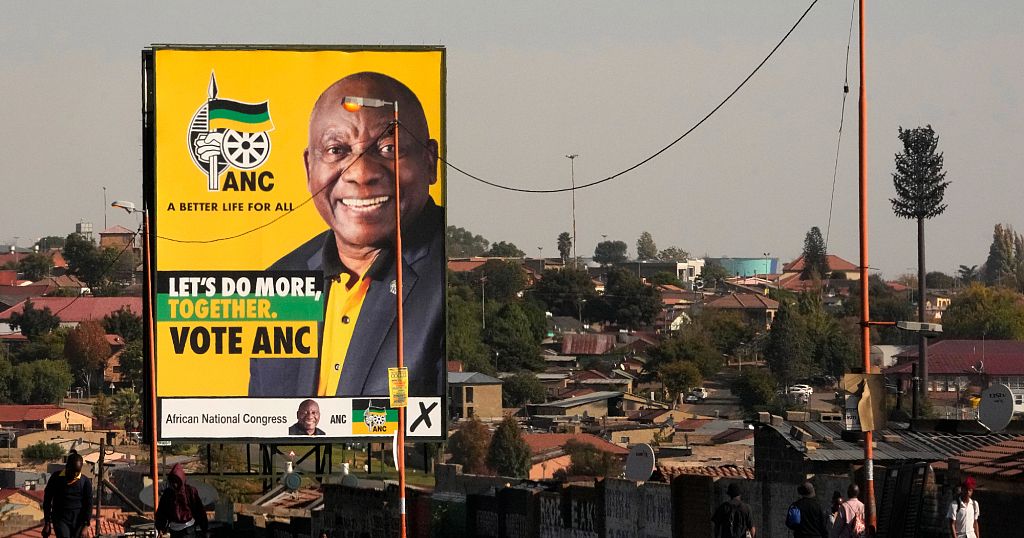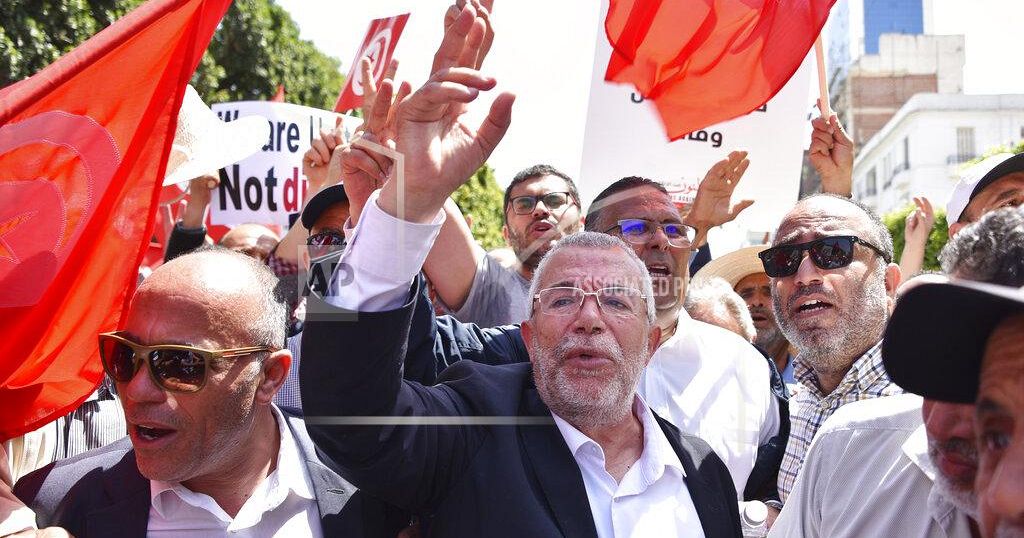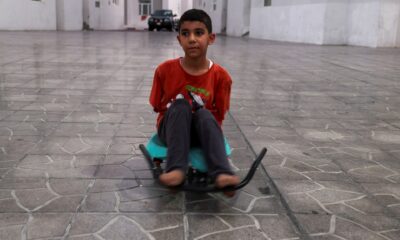Africa
Electric tricycles empower women in rural Zimbabwe

Anna Bhobho, a 31-year-old housewife from rural Zimbabwe, arrives at market, her electric tricycle laden with tomatoes. Bhobho was once a silent observer in her home, excluded from financial and family decision-making in the deeply patriarchal society. Today, she is a driver of change in her village, thanks to an electric tricycle she now owns and uses to deliver crops for farmers in Wedza district, about 150 kilometers (nearly 100 miles) from Harare.
In many parts of rural sub-Saharan Africa, women have long been excluded from mainstream economic activities such as operating public transportation. However, three-wheelers powered by green energy are reversing that trend, offering financial opportunities and a newfound sense of importance. “My husband now relies on me to cover most household expenses, from groceries including school fees for our children and buying furniture. Before I could not do it but thanks to this tricycle I can now also chip in and help.” says Bhobho.
Called “Hamba,” meaning “go” in Ndebele, the tricycles are powered by solar-charged lithium-ion batteries. Mobility for Africa, a local startup, piloted the project in 2019 by leasing the vehicles to groups of women for $15 a month. Today, individual women like Bhobho can own them through a lease-to-purchase program. Bhobho now owns land, has opened a small grocery store, is paying off a car and has moved her children from an underfunded rural public school to a better-equipped private institution. She earns up to $300 a month, comparable to government workers like schoolteachers. Beyond material gains, she has gained self-esteem. “Even my husband and in-laws have more respect for me now. No one used to listen to me, but now I have a seat when important decisions are being made,” says the mother of three.
In Zimbabwe, the lives of many women have changed dramatically, even for those who don’t own tricycles but use them for daily chores. Gone are the days of carrying firewood, buckets of water or heavy farm produce over long distances. The tricycles, able to navigate narrow paths inaccessible to cars, reach remote homesteads and vegetable gardens. Their affordability makes them accessible to locals.
Hilda Takadini, a tomato farmer, says her business has flourished since she started using Bhobho’s transport services. Previously, she had to leave home at 3 a.m., using an ox-drawn cart to travel 18 kilometers (11 miles) to the market. Often, she arrived too late or not at all, and her tomatoes rotted. “In the past transporting our produce to the market was a nightmare we would wake up at 3 am and travel a very long distance using an ox-drawn cart but now it is much easier we can reach the market on time,” says the 34-year-old mother of six. In Wedza, only women own and operate the tricycles. They receive training in safe driving skills, and swapping a lithium battery for a fully recharged one after about 100 kilometers (about 70 miles) costs $1. According to Carlin Thandi Ngandu, the community engagement coordinator for Mobility for Africa, 300 women across Zimbabwe are part of the program, with a goal of ensuring that 70% of the beneficiaries are women. “We are providing rural communities with affordable transport solutions, especially to women.
Most of the women spend countless hours trying to reach the markets, the hospitals and also the water sources, so the tricycle has just improved the last mile mobility because most of the women could not get to the market on time and they could not afford some of the transport costs that were being charged to hire a vehicle to go to the market,” says Ngandu.
The tricycles are also revolutionising health care access, particularly for women and children. Josephine Nyevhe, a volunteer community health worker, uses her tricycle to bring medical services closer to rural families. After meeting a group of mothers with children by a roadside, Nyevhe hangs up a weighing scale on a tree branch to check their children’s weight. Many times, her tricycle has served as a village ambulance. “The other day I got a call to attend to a pregnant woman. I’m there to respond to emergencies, so on that day, I used my Hamba tricycle to rush her to the clinic where she got assistance” she says.
At Wedza shopping centre, nearly a dozen women line up with their tricycles, which can carry loads of up to 450 kilograms (nearly 1,000 pounds) and have a top speed of 60 kmph (37 mph), waiting for customers. They transport passengers, patients heading to hospitals and people carrying building materials such as bricks, groceries and firewood. However, the women have to contend with challenges such as rough terrain worsened by recent rains, as well as a number of men resistant to seeing women lead in traditionally male-dominated spaces, Bhobho says.
Africa
Iran, US confirm third round of nuclear talks in coming week

US and Iranian delegations held talks in Rome on Saturday on Tehran’s nuclear program with further meetings planned for next week.
Iran’s Foreign Minister Abbas Araghchi described the talks as constructive.
The delegations held four rounds of indirect talks at the Omani embassy in Rome. Omani counterpart Badr Albusaidi shuttled between the rooms, delivering messages exchanged by the two sides.
“This time we managed to reach a better understanding about some principles and goals. Ultimately it was agreed that the talks continue and we enter the next stage and expert meetings start. Starting this Wednesday, technical meetings at experts level will start in Oman,” said Araghchi.
A third round of talks in Oman on April 26.
Donald Trump who in 2018 unilaterally abandoned a landmark nuclear accord signed and brokered by world powers in 2015 has demanded a new deal with Tehran and threatened to bomb it.
Africa
Unprecedented trial for apartheid atrocities opens in South Africa

A significant step by South Africa’s legal system in confronting the atrocities of the country’s dark political past.
A judge this week approved the trial of two apartheid-era police officers for their involvement in the 1982 assassination of three student activists.
The prosecution is unprecedented. Until now, no individual had been held accountable for the crime of apartheid.
The case centers around three young freedome fighters killed in an explosion in 1982. The victims were part of a resistance movement opposed to the apartheid regime which enforced White-only rule and domination over the Black majority.
Experts say the trial could open the door for others.
Also this week, South Africa reopened an investigation into the death Albert Luthuli, a former president of the African National Congress (ANC) and Nobel Peace Prize laureate, who was killed in 1967.
The prosecuting authority seeks to have the findings of previous inquests into Luthuli overturned.
The authorities at the time had concluded that Luthuli’s death the result of an accident.
The development comes more than 30 years since South Africa became a democracy and after a Truth commission unearted numerous atrocities.
Africa
Tunisia jails opponents, critics of President Saied

Tunisia on Friday handed opponents of President Kais Saied lengthy jail terms after convicting them of plotting against state security.
Issam Chebbi and Jawhar Ben Mbarek of the opposition National Salvation Front coalition, as well as lawyer Ridha Belhaj and activist Chaima Issa, were sentenced to 18 years behind bars, their lawyer said.
Businessman Kamel Eltaief received the harshest penalty of 66 years in prison.
They are among forty people, including high-profile politicians, businessmen and journalists, who who were being prosecuted on security and terrorism charges.
Critics say the charges lacked merit, and only served to consolidate Saied’s power grab.
The president won re-election virtually unchallenged last year after the jailing or disqualification on flimsy grounds of his opponents.
Saied has ruled mostly by decree since dismissing parliament in 2022 and promulgating a revised constitution giving himself wideranging powers in 2023.
-

 Education2 days ago
Education2 days agoHarvard’s battle with the Trump administration is creating a thorny financial situation
-

 Sports2 days ago
Sports2 days agoClint Dempsey speaks to CNN over his concerns over the USMNT heading into its home World Cup
-

 Europe2 days ago
Europe2 days agoTrump’s ‘lone ranger’: How Steve Witkoff became the defacto point man on America’s foreign policy challenges
-

 Conflict Zones2 days ago
Conflict Zones2 days agoIran has ‘doubts’ about US intentions ahead of nuclear talks | Politics News
-

 Middle East1 day ago
Middle East1 day agoTunisian court hands opposition figures lengthy jail terms | Human Rights News
-

 Conflict Zones2 days ago
Conflict Zones2 days ago‘How do I live like this?’ asks Gaza boy who lost arms in Israeli attack | Gaza News
-

 Conflict Zones2 days ago
Conflict Zones2 days agoTrump says US may ‘pass’ on helping end war if Russia, Ukraine resist deal | Russia-Ukraine war News
-

 Africa1 day ago
Africa1 day agoUnprecedented trial for apartheid atrocities opens in South Africa




